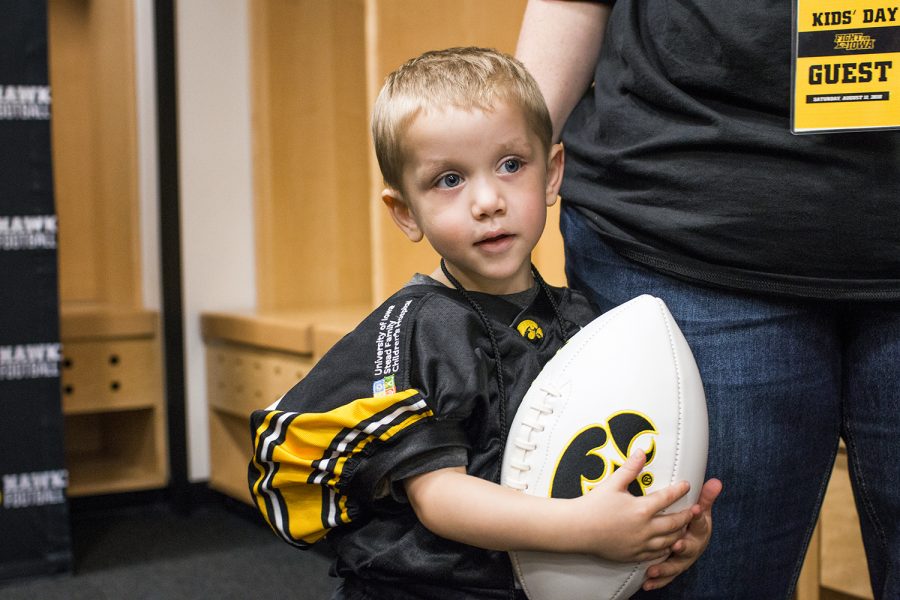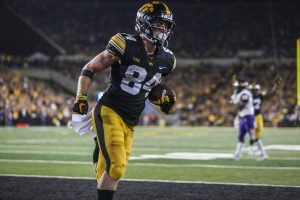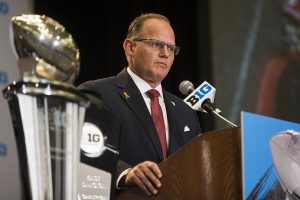2-year-old Kid Captain thrives with the help of an altered diet
This week’s Kid Captain Mason Zabel is a “healthy, normal boy” thanks to a dietary treatment for PKU, which can cause brain damage.
Kid Captain Mason Zabel holds a football during Iowa Football Kid’s Day at Kinnick Stadium on Saturday, August 11, 2018. The 2018 Kid Captains met the Iowa football team and participated in a behind-the-scenes tour of Kinnick Stadium. Each child’s story will be featured throughout the 2018 Iowa football season.
October 11, 2018
When Mason Zabel came home from the hospital a few days after his birth, his parents had to take him right back because of the results of his newborn scans.
His scans came back positive for phenylketonuria, a rare genetic disorder that can be toxic to the brain if left untreated.
Mason, now a 2-year-old from Independence, Iowa, has a treatment in place that allows him to be a normal, happy kid who likes football and playing outdoors.
This week, Mason will be the Hawkeyes’ Kid Captain in their road game against Indiana.
RELATED: This week’s Kid Captain loves exploring wildlife
“He’s so excited,” said Jessica Zabel, Mason’s mother. “We’re having a party [at home this week] to celebrate, and we’re going to the Homecoming game next week.”
Judy Miller, a nurse practitioner at the University of Iowa Stead Family Children’s Hospital, said she first saw Mason’s newborn scan that showed he may have phenylketonuria.
When someone suffers from that, she said, an enzyme in the body doesn’t function normally and cannot break down phenylalanine, an amino acid found in a protein.
Because the scan caught phenylketonuria early, Miller said, the Zabels were able to immediately begin treatments to stop some of the brain damage that can occur in patients.
“Thank goodness for newborn scans,” she said. “That way, we can prevent any permanent damage.”
When she met the Zabels, Miller said, they had never heard of phenylketonuria. Because it is a genetic condition, she said, both parents of a child with phenylketonuria must be carriers, though the parents may not know this.
The main treatment Mason needs is changes to his diet, she said. Miller works with a nutritionist to keep Mason healthy.
A part of the diet includes having Mason drink a medical formula that is tailored to his needs, Miller said. The formula has the amino acid Mason’s body can’t break down taken out of it, so he can still receive necessary nutrients from proteins in a safe manner.
As of right now, she said, Mason will have to drink the formula for the rest of his life, but it will be altered according to his needs as he grows. When he begins attending school, she said, his school lunches will have to be altered.
“He’s a healthy, normal boy,” Miller said. “He just has to drink something different and eat something different.”
Jessica Zabel said Mason follows a strict low-protein diet, which means eliminating such items as meat, bread, milk, eggs, and some fruits and vegetables.
She said the family goes to Iowa City every other month for checkups, and they do an at-home blood test once a week.
Tim Zabel, Mason’s father, said the family is extremely thankful to the UI Stead Family Children’s Hospital for everything the staff have done for Mason.
While still young, Mason is understanding when he asks for something to eat and is told he can’t have it, Tim Zabel said.
The Zabels want to raise awareness of phenylketonuria and help other families who are finding out their newborns have phenylketonuria, as well, he said.
“[Phenylketonuria] is treatable through diet,” he said. “Mason’s not any different from anybody else.”








